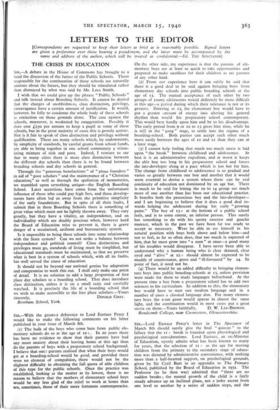LETTERS TO THE EDITOR
[Correspondents are requested to keep their letters as brief as is reasonably possible. Signed letters are given a preference over those bearing a pseudonym, and the latter must be accompanied by the name and address of the author, which will be treated as confidential.—Ed. THE SPECTATOR]
THE CRISIS IN EDUCATION
Sue, —A debate in the House of Commons has brought to a head the discussion of the future of the Public Schools. Those responsible for the continuation of these schools are naturally anxious about the future, but they should be stimulated rather than dismayed by what was said by Mr. Lees Smith.
I wish that we could give up the phrase " Public Schools " and talk instead about Boarding Schools. It cannot be denied that the charges of snobbishness, class distinction, privilege, extravagance have a certain amount of justification. It would, however, be folly to condemn the whole body of these schools to extinction on those grounds alone. The case against the schools, moreover, is weakened by exaggeration. Possibly it does cost £250 per annum to keep a pupil at some of these schools, but in the great majority of cases this is grossly untrue. Nor is it fair to speak of class distinction and privilege without qualification. There are many schools which, by endowments, by simplicity of standards, by careful grants from school funds, are able to bring together in one school community a stimu- lating mixture of rich and poor. Indeed, I venture to say that in many cities there is more class distinction between the different day schools than there is to be found between boarding schools and day schools in general.
Through the " generous benefactions " of " pious founders " in aid of " poor scholars " and the maintenance of a " Christian education," as well as through the spoliation of monasteries, we stumbled upon something unique—the English Boarding School. Later accretions have come from the unfortunate influence of those who could pay high fees, and these develop- ments have often led us away from the primitive simplicity of the early foundations. But in spite of all their faults, I submit that in these Boarding Schools there is something of great value which must not be lightly thrown away. They vary greatly, but they have a vitality, an independence, and an individuality which are doubly precious when, however hard the Board of Education tries to prevent it, there is grave danger of a secularised, uniform and bureaucratic system.
Is it impossible to bring these schools into some relationship with the State system? Can we not strike a balance between independence and political control? Class distinctions and privileges must go, standards of living must be simplified, but educational standards must be maintained, so that we preserve what is best in a system of schools which, with all its faults, has well served the cause of education.
It should not be beyond our national genius for adaptation and compromise to work this out. I shall only make one point of detail. It is no solution to add a large proportion of free place day scholars to a boarding school. That does introduce class distinction, unless it is on a small scale and carefully watched. It is precisely the life of a boarding school that we wish to make accessible to the free place scholars.—Yours






















































 Previous page
Previous page